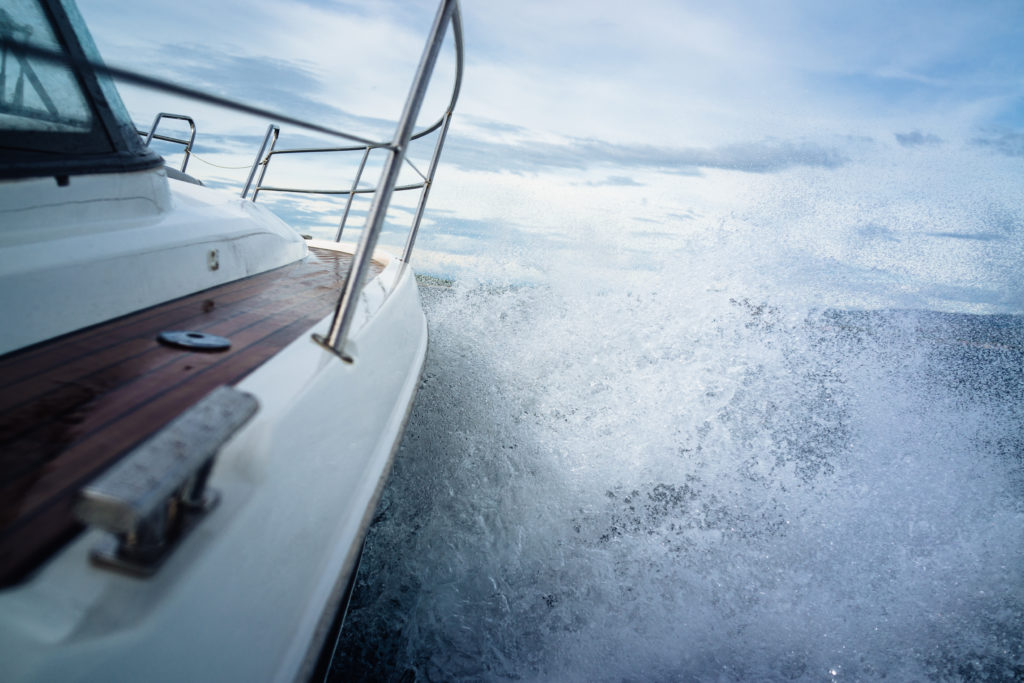When a storm comes in, motorboating in adverse weather conditions can be challenging and sometimes dangerous, but with proper preparation, equipment and knowledge, you can help ensure the wellbeing and safety of your crew and boat. Here are some essential motorboating tips for poor weather conditions:
Check Weather Forecasts
Whenever you go out on the water, in any vessel, from a canoe to a large motorboat, it’s always essential to check the weather forecast before heading out. It’s always important to check a specific shipping forecast such as the MetOffice Shipping Forecast or Wind Guru, which details current and future wind speed, direction, sea state and visibility. Don’t just rely on the standard weather app on your phone.
Safety Equipment
Lifejackets should be worn at all times when out on the water in your motorboat – treading water for 10 mins before you get rescued is exhausting even on a flat calm day. Harnesses should be worn and clipped on if the weather gets worse.
Keep Snacks and Drinks on Board.
Even in moderate seas, preparing a gourmet lunch may not be on the cards. Being down below can increase seasickness, and holding on in a galley in a rolling sea is no fun! Make sure you have a supply of high energy snacks and drinks on hand that can be easily grabbed to keep hunger at bay and boost morale.
Write a Passage Plan
Writing a passage plan is actually a SOLAS legal requirement every time you leave your berth. When written, a passage plan will help ensure your trip is safe and achievable, and your approximate timings will allow you to predict when you might enter any potentially treacherous waters, such as crossing a sand bar, which might be made even worse in bad weather or at a certain point of the tide. Informing someone ashore about your route, estimated return time, and emergency contact information is also essential.
Seek a Safe Harbour
It is essential to monitor the weather throughout a passage, especially long ones. If the weather changes, it may be the most sensible option to seek a safe harbour until the bad weather has blown through and conditions improve. Local Pilotage books can advise on the suitability of a harbour in different wind directions. You may need to anchor so make sure your anchor is always ready to drop easily.
Reduce Speed
In rough weather, slow down your motorboat to reduce the impact of waves and maintain better control of the boat. Adjusting the trim tabs will help to keep the bow down and maintain better stability.
Head Into Waves
If you encounter heavy seas, it’s generally safer to head into the waves rather than running with them or taking them beam on.
Stow Loose Items
Secure loose gear and equipment on board to prevent injury or damage during rough conditions.
Maintain a Watch
Assign someone on board to keep a constant lookout for other vessels, navigational hazards, and changes in weather.
Anticipate Sea Sickness
Be prepared for motion sickness among passengers. Keep a stock of Stugeron (or equivalent) on board for passengers. Making sure they keep their eyes on the horizon will also help.
Emergency Procedures
Know how to respond in an emergency situation. Make sure your crew practice man-overboard drills and other safety procedures such as use of the VHF radio and the issuing of Mayday calls, regularly.
Respect Your Limits
Don’t push the limits of your motorboat or your skills in adverse weather. It’s better to err on the side of caution.
Get More Qualified
If you would like to improve your motorboat handling skills, consider completing the RYA Coastal Skipper Practical Motor Cruising Course, or a Yachtmaster course.
If You Need To Make a Marine Insurance Claim
Motorboating in bad weather can sometimes lead to breakages or damage, no matter how well you follow motorboating tips. Our claims guidance page will help you make a claim.
Always prioritise safety when motorboating in adverse weather. If conditions deteriorate beyond your comfort level or safety threshold, it’s better to turn back or find shelter. Boating in rough conditions requires experience and good judgment, so ensuring you have the skills and knowledge to handle adverse weather situations will keep your crew and your boat safe.

